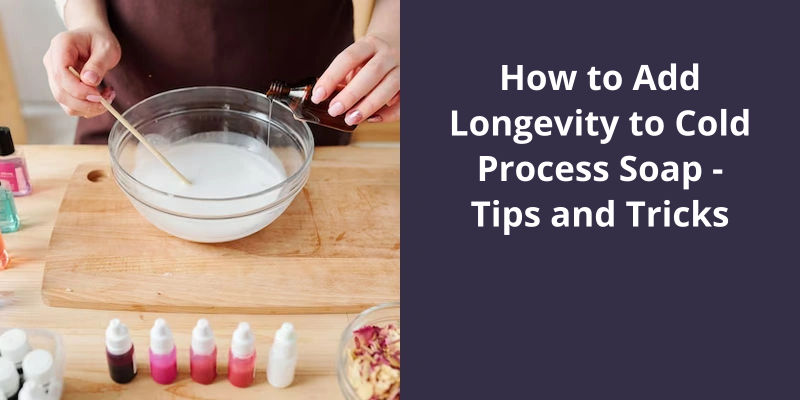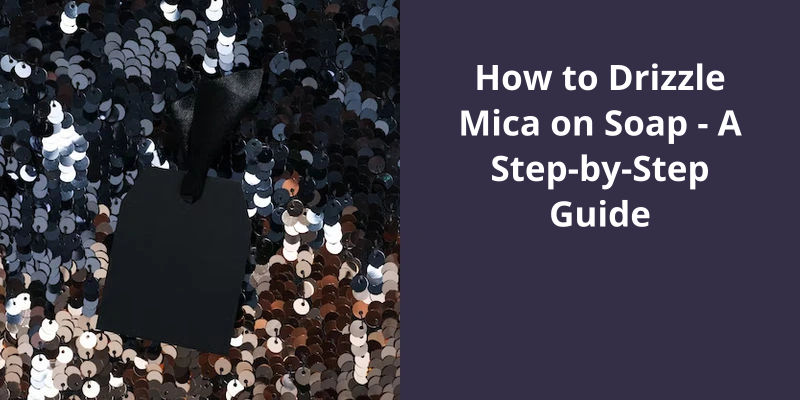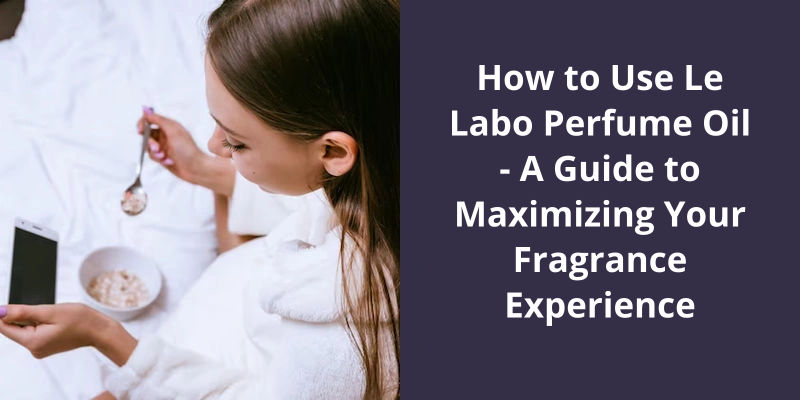To increase the longevity of your cold process soap, you should consider several things. First, choosing hard oils like coconut oil, palm oil, lard, or tallow for your base will enhance the product’s life since they create a harder bar soap. You should also allow your soap to cure fully, which generally takes around 4-6 weeks. This process allows the water to evaporate out of the soap, making it harder and long-lasting. Another point to note is that using a high superfat level can reduce your soap’s shelf life as extra oils can become rancid. Therefore, it’s best to keep the superfat level around 5%. Lastly, proper storage also plays a key role in adding longevity, so keep the soap in a dry, ventilated, and cool place, away from direct sunlight.

How Do You Increase the Shelf Life of Soap?
Soap is an essential item in our daily lives. We use them to clean our hands, faces, and bodies. However, soap doesn’t last forever. Over time, it can become soft and mushy, making it difficult to use. When this happens, the soaps shelf life is said to have ended. The question is, how can we make the soap last longer?
One way to increase the shelf life of soap is to keep them dry after use. It’s essential to ensure that your soap isn’t left damp after bathing. When the soap is left in contact with moisture, it becomes soft and mushy. Therefore, it’s advisable to use a soap dish with drainage holes and leave the soap to dry between uses.
Soap savers are made of cotton materials, and they help to keep the soap dry after use. The cotton material is absorbent, and it takes up excess moisture from the soap. This ensures that the soap remains dry, and therefore, it lasts longer. Soap savers are an affordable way of prolonging the shelf life of your soap.
When buying soap, it’s crucial to consider the ingredients used. Some soaps may contain ingredients that make them more prone to melting. For instance, glycerin soaps tend to melt faster since they attract water. Therefore, it’s advisable to opt for soaps with ingredients that don’t attract water and are therefore less likely to soften and melt.
Exposure to high temperatures can cause soap to melt and produce a greasy residue. Therefore, it’s advisable to store your soap in a cool place away from direct sunlight. This will prevent the soap from melting, and it will retain it’s texture and fragrance for longer.
These simple steps won’t only save you money but also help reduce waste and promote sustainability. So, go ahead and take good care of your soap and make it last longer.
How to Properly Store Soap for Maximum Shelf Life
- Always store soap in a cool, dry place.
- Avoid exposing soap to direct sunlight or extreme temperatures.
- Keep soap away from moisture to prevent it from melting or becoming mushy.
- Use a soap dish or tray with good drainage to prevent soap from sitting in water.
- Rotate your soap regularly so that older bars get used first.
- Avoid storing soap in airtight containers, which can trap moisture and cause soap to soften.
Understanding the concept of longevity in soap making is essential to produce high-quality bars that last longer. However, achieving longevity can be tricky, as it may reduce the soap’s lather quality. In this article, we will explore the different factors that affect longevity, and how you can use this information to create long-lasting and luxurious soap bars. So, let’s get started!
What Does Longevity Mean in Soap Making?
One factor that impacts longevity in soap making is the type and quality of oils used. Oils with high levels of oleic acid, such as olive oil or almond oil, tend to have a higher longevity score due to their stability, while oils high in linoleic acid, like sunflower or safflower oil, may have a lower score. Additionally, oils with a low iodine value, indicating a lower level of unsaturation, are less susceptible to oxidation and rancidity, contributing to a longer shelf life.
Another important factor for longevity is proper curing. Allowing soap to cure for several weeks after being made allows excess water to evaporate, resulting in a harder, longer-lasting bar. Curing can also improve the lather and overall quality of the soap. It’s crucial to store cured soap in a cool, dry place to prevent moisture buildup and spoilage.
Aside from ingredients and curing, a soaps pH level can also impact it’s longevity. Soap with a high pH level can be harsher and more drying, which can cause it to break down more quickly. While pH levels can vary depending on the recipe, most soaps fall within a range of approximately 8-10.
The type of essential oils or fragrances used can impact the overall sensory experience, while additives such as herbs, clays, or charcoal can contribute to skin benefits like exfoliation or detoxification. Ultimately, the best soap recipe will depend on individual preferences and needs.
Understanding the impact of oils, curing, pH levels, and other factors can help achieve a longer-lasting, higher-quality bar. By choosing the right ingredients and following proper techniques, soap makers can create a product that not only cleanses but also nourishes and indulges the senses.
The Impact of Water Hardness on Soap Longevity
Water hardness refers to the amount of dissolved minerals, such as calcium and magnesium, in water. Hard water can affect soap longevity by reducing it’s ability to create lather and clean effectively. Soap scum may also form when soap mixes with hard water. This can lead to decreased soap life and buildup on surfaces.
So, if you’re wondering whether your handmade soap will last for a long time, the answer is that it really depends on a few different factors. But in general, with proper care and storage, you can enjoy your handmade soap for quite a while before it starts to lose some of it’s properties.
How Long Does a Handmade Soap Last?
Handmade soap typically lasts longer than commercially produced soap because it contains natural ingredients that don’t break down as quickly. This means that if you stock up on your favorite handmade soap, you can use it for months or even years without worrying about it going bad.
A lot of factors can affect the lifespan of handmade soap, including the type of oils used, the curing process, and the storage conditions. Soap made with oils that are prone to rancidity, such as hemp oil or flaxseed oil, may not last as long as soap made with stable oils like coconut oil or olive oil. Likewise, soap that isn’t cured properly or stored in a warm, humid environment may develop mold or mildew, shortening it’s lifespan.
To extend the life of your handmade soap, it’s important to store it properly. Ideally, soap should be stored in a cool, dry place away from direct sunlight and heat. A linen closet, for example, is a great place to keep your soap. It’s also a good idea to keep your soap in a container with good ventilation, like a mesh bag or an open tray, to allow air circulation and prevent moisture buildup.
If youre using your soap in the shower or bath, make sure to rinse it off thoroughly and allow it to dry between uses. Soap that stays wet and soggy can break down more quickly, shortening it’s lifespan. You can also extend the life of your soap by cutting it into smaller pieces and using one at a time, rather than using the whole bar at once.
Source: Shelf Life for Handmade Soap – The Nova Studio
Maintaining the quality of homemade soap can be tricky, but this doesn’t have to be the case. By following a few simple tips, you can extend the life and scent of your soap. In the next section, we’ll take a closer look at some practical strategies you can use to prevent your soap from going rancid.
How Do You Keep Homemade Soap From Going Rancid?
The main factor to keep in mind when trying to prevent rancidity in homemade soap is the oils and fats used in the recipe. Choosing oils that are less prone to rancidity, like coconut oil and palm oil, can help to prolong the shelf life of your soap. Additionally, adding certain additives like vitamin E and rosemary extract can also help to slow down the oxidation process and prevent rancidity.
Curing is the process of allowing the soap to dry out and harden before use, which can take anywhere from a few weeks to a few months. During this time, it’s important to keep the soap in a cool, dry place with good air circulation to prevent moisture buildup. Once the soap is fully cured, storing it in a cool, dry place like a linen closet or dresser drawer can help to further prolong it’s shelf life.
If you’re using essential oils or other scent additives in your soap, it’s important to use high-quality, pure oils that aren’t prone to oxidation. Adding essential oils or botanicals that are already rancid can actually speed up the process of rancidity in the soap, so it’s important to test any new additives before using them in your soap.
Another important consideration is the type of container you store your soap in. Plastic containers can leach chemicals into the soap over time, which can cause the oils to break down more quickly. Glass or ceramic containers are usually a better choice for long-term storage.
Lastly, it’s important to note that even with proper storage and handling, all soap will eventually go rancid. The goal is simply to prolong the shelf life as much as possible and enjoy your homemade soap while it lasts! By following these tips and being mindful of the ingredients and storage conditions, you can keep your homemade soap smelling and performing it’s best for as long as possible.
How to Detect Rancidity in Soap
To detect rancidity in soap, you can use your senses such as smell and touch. If the soap smells off, stale or musty and feels greasy or slimy to the touch, it’s likely rancid. You may also look for discoloration or signs of mold growth on the soap as indicators of rancidity.
In addition to using the appropriate water and equipment when making soap, there are a number of other steps you can take to prevent rancidity. By taking a few simple precautions, you can ensure that your soap stays fresh and effective for longer, avoiding the need to replace it prematurely and saving you time and money in the long run.
How Do You Prevent Rancidity in Soap?
Rancidity is a common problem that soap makers face. It occurs when the oils and fats in the soap react with oxygen in the air, causing them to break down and produce an unpleasant odor.
Firstly, it’s essential to use distilled, deionized, or reverse osmosis water when making soap. This is because tap, spring, or drinking water may contain trace metals that can trigger rancidity.
Secondly, when making soap, it’s best to use plastic equipment as much as possible. This is because plastic doesn’t react with the oils in the soap, unlike metal. However, if you must use metal utensils such as a stick blender, it’s best to choose stainless steel.
Another way to prevent rancidity in soap is to use a preservative. There are several natural preservatives that you can use, such as vitamin E, rosemary extract, and grapefruit seed extract. These preservatives can help to extend the shelf life of your soap and prevent rancidity.
It should be stored in a cool, dry place away from direct sunlight. If you live in a humid climate, it may be best to store your soap in an airtight container to prevent moisture from getting in.
Lastly, it’s important to use fresh oils and fats when making soap. Oils and fats that are old or have been exposed to air can spoil and trigger rancidity. When buying oils, make sure to check the expiration date and store them in a cool, dry place away from direct sunlight.
By taking these steps, you can ensure that your soap stays fresh and doesn’t develop an unpleasant odor.
How to Use Antioxidants to Prevent Rancidity in Soap
- Add natural antioxidants like vitamin E, rosemary extract, or green tea extract to your soap recipe
- Use oils that are high in natural antioxidants such as olive oil and coconut oil
- Avoid using highly unsaturated oils like sunflower oil or soybean oil as they can become rancid quickly
- Store your soap in a cool, dry place away from sunlight
- Consider using an antioxidant-rich oil blend as a preservative for your soap
Conclusion
In conclusion, adding longevity to cold process soap requires a consideration of several factors including the ingredients used, the curing process, and the storage conditions. Using hard oils, stearic acid, and sodium lactate or salt can all contribute to making your soap firmer, thus helping it last longer in the shower. Properly curing the soap over a period of four to six weeks is also crucial. Additionally, using a draining soap dish to prevent standing water and excess moisture can further extend the lifespan of your soap. By taking these simple steps, you can create soap that isn’t only long-lasting but also effective and enjoyable to use.





